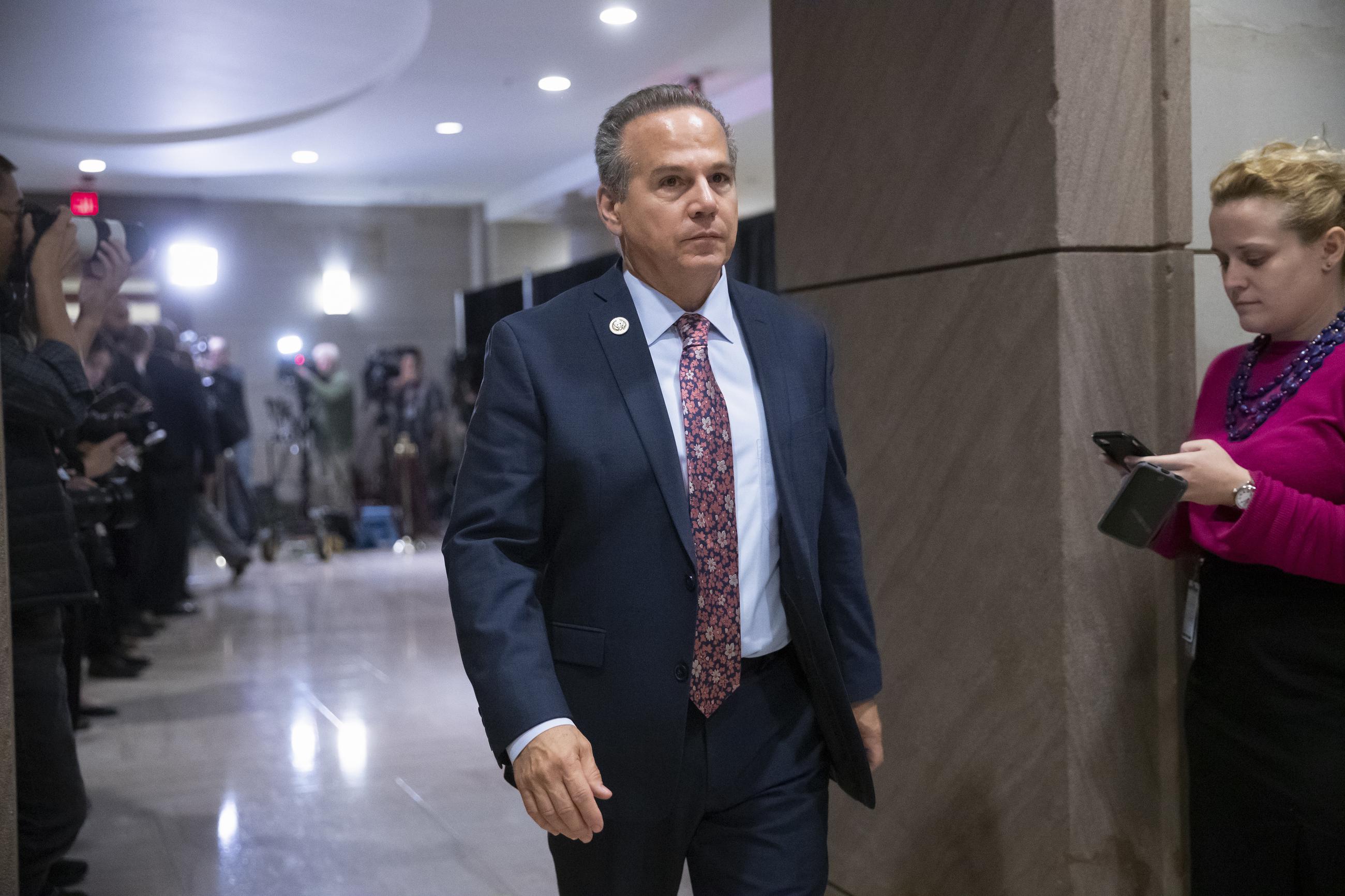Cicilline, Gun Groups Court Moderate Dems on Assault-Weapons Ban
Three freshman Democrats will formally sign onto the legislation Friday, bringing it just shy of the 218 lawmakers needed to pass the lower chamber.

Rep. David Cicilline of Rhode Island is inching closer toward a vote on legislation long sought by many Democrats and gun-control groups: banning the sale of assault weapons.
Three freshman lawmakers—Reps. Colin Allred, Elaine Luria, and Kim Schrier—have signed onto a measure to outlaw the sale of assault weapons like those used in the recent shootings in Texas and Ohio. Those cosponsors are set to be formally submitted Friday.
“It’s time to act to keep our communities safe from preventable gun violence,” Luria said in a statement. “We should implement universal background checks and pass legislation to keep weapons of war off our streets.”
It’s the latest development in a slow progression for the bill, which Cicilline introduced in February, and an indication that there is momentum among Democrats to go beyond the proposals to tighten background checks and create federal red-flag laws that could emerge from a deal between House, Senate, and White House negotiators in the coming weeks.
Although the assault-weapons ban would be largely symbolic—Senate Republicans and the White House almost certainly won’t entertain the idea—proponents say there is political value in passing the measure in the House.
“My view is that it’s still valuable to do it because we need to show the American people that we’re acting and we’re responding to the epidemic of gun violence in this country,” Cicilline said.
Passing the measure would communicate “to the American people where the impediment to progress is here,” he said.
Cicilline’s bill will have 211 cosponsors once the three new members sign on. The majority of cosponsors signed on when the measure was first introduced, but after the grim spate of mass shootings this year, more Democrats have come on board. Key to the measure reaching the 218 votes needed to pass are moderate Democrats, many of whom flipped formerly red seats in the 2018 election or won in districts Donald Trump carried in 2016, like the three new cosigners.
House leadership and gun-control advocates have hammered Senate Majority Leader Mitch McConnell for refusing to take up H.R. 8, House-passed legislation tightening background-check rules, and the House Judiciary Committee is set to mark up an additional three bills next week that would create a federal red-flag provision and limit the sale of high-capacity magazines, among other new restrictions.
But absent among those bills is legislation resurrecting the federal ban on assault weapons that Congress allowed to expire in September 2004, nearly 15 years ago to the day.
Cicilline introduced the assault-weapons ban shortly after Democrats took back the House, but the bill hasn’t advanced. There are several reasons for holding off on the legislation, particularly until it reaches 218 cosigners, Cicilline said.
“We know for sure that Mitch McConnell will never take up the assault-weapons ban no matter what, so the question becomes, if you are going to bring this bill to the floor to try to put pressure on Mitch McConnell, bringing it to the floor and making sure it passes and that it has the strongest showing of support it has is critical,” he said.
Trump has said there is “no political appetite” for an assault-weapons ban.
Cicilline said he hasn’t spoken to House Speaker Nancy Pelosi about a floor vote for the bill—he’s waiting for the 218th signature. And then, he said, there’s the calculation Pelosi must make about moving a bill that’s sure to go nowhere in the Senate.
Pelosi’s office didn’t respond to a request for comment on advancing Cicilline’s bill.
Cicilline admits that there is an argument for focusing on the background-check legislation—something with at least a remote chance of making it to Trump’s desk—and not clouding the issue with other measures, a decision Pelosi will have to make.
“There is some sense of, ‘Let’s not lose focus on the bills that have already passed that are sitting on McConnell’s desk,’” Cicilline said. “Part of it is to make it clear that the Democrats have taken responsible action to reduce gun violence already.”
But first, he must reach the 218-vote threshold.
Out of the 31 Democrats who won Trump districts, 14 have signed on to the bill, leaving 17 members for Cicilline and other gun-control advocates to woo, according to an analysis by National Journal.
J.P. Thomas, senior program manager at Brady, the gun-control group, said he’s focusing on the handful of members who have publicly backed an assault-weapons ban but have yet to sign on to the legislation. It’s important that they cosign before Sept. 25, when the Judiciary Committee is set to hold a hearing on banning assault weapons and a coalition of gun-control groups will hold a corresponding rally, he said.
“One thing that we’ve been doing is pulling up their records and what they said on their campaign websites in 2018, and if they supported it then, [then] this is where the rubber meets the road,” Thomas said of the group’s work on moderate Democrats. “Because we have the [Sept.] 25th hearing, and we want to reach 218 by then.”
Politically, passing an assault-weapons ban in the House could cut both ways. The legislation would delight the Democrats’ liberal base and provide contrast with Republicans, who have failed to advance any gun legislation. However, for moderate, and in some cases vulnerable, House Democrats in Trump districts, it could antagonize strident Second Amendment supporters in their districts and allow their Republican opponents to cast them as gun-grabbing liberals. Democrats lost the House in 1994 in part because of a National Rifle Association-led backlash to the original ban.
“There is no doubt this is different qualitatively from background-check bills or red-flag bills,” Cicilline said. “Those are all bills which are designed to keep guns out of the hands of criminals who shouldn’t have a gun. Those are, I think, a different kind of legislation. This is a bill that bans a particularly dangerous weapon.”
Unlike the broader talk of red-flag laws and tighter background-check regulations, banning assault weapons remains a polarizing, partisan issue. One Republican, Rep. Peter King of New York, has signed onto Cicilline’s bill, but Cicilline says he’s courting other Republicans.
An NPR poll released in July found that while a majority, 57 percent, of Americans favored banning assault rifles like the AK-47 and AR-15, just 29 percent of Republicans supported the move, compared to 83 percent of Democrats.
A Politico/Morning Consult poll conducted in the aftermath of the El Paso and Dayton, Ohio shootings, however, saw the number of Republicans backing a ban grow, with 55 percent of GOP voters approving a ban on assault weapons.
Thomas said he’s focusing on several Republicans, too. Rep. Brian Mast of Florida has said he’d back a ban, but he has yet to sign onto Cicilline’s bill. Rep. Mike Turner, whose district includes Dayton, said after the shooting there that he’d back an assault-weapons ban, but he hasn’t cosigned the bill. Other members include Rep. Chris Smith of New Jersey, whom Brady endorsed, and Rep. Brian Fitzpatrick of Pennsylvania, who was one of the 232 cosponsors on the House-passed background-check bill.
In the Senate, Minority Leader Chuck Schumer plans to make guns a key focus for the fall, according to a Dear Colleague letter sent to his caucus Thursday. Senate Democrats will continue to push for a floor vote on H.R. 8, the House-passed background-check bill. McConnell has said he won’t put a gun-control bill to a vote without Trump’s pre-approval, though the White House has not given many details about which policies the president would support. It’s likely that the House-passed bill will be a nonstarter, as it would bar most sales from unlicensed dealers.
Like Cicilline, Thomas said the lack of action in the Senate is partly the point of the assault-weapons bill—to project to voters in the run-up to the 2020 elections what a Democratic-led government would do on gun policy.
“We think it’s something that will allow leaders in Congress to show that, ‘We’re prioritizing this issue, and we’re passing this thing in the House because you elected gun-violence-prevention champions in the House, and we don’t have those same leaders in the Senate and these bills are not going through,’” he said.
You may also like
-
The Biden Administration Is Trying to Expand Background Checks for Gun Sales
-
STATEWIDE GUN REGISTRATION, I’ve told you time and again, “Universal Background Checks” are coming!
-
Hollywood, Brady Pushing Gun Control in TV Shows
-
Minnesota Updates Lawsuit Over Retail Store’s Gun Sales (FLEET FARM) like the one in Manitowoc.
-
ATF’s Continued Tiahrt Violations Enabling Leftist Media DOXXING of Innocent Gun Stores

